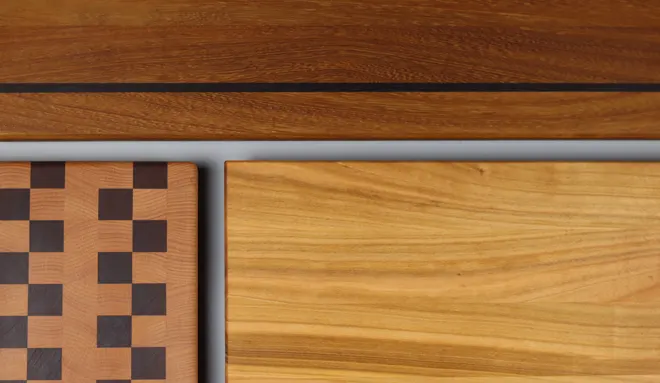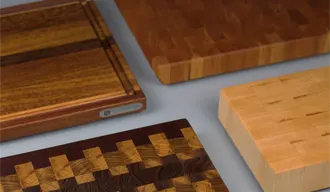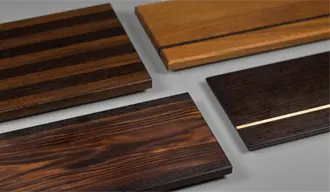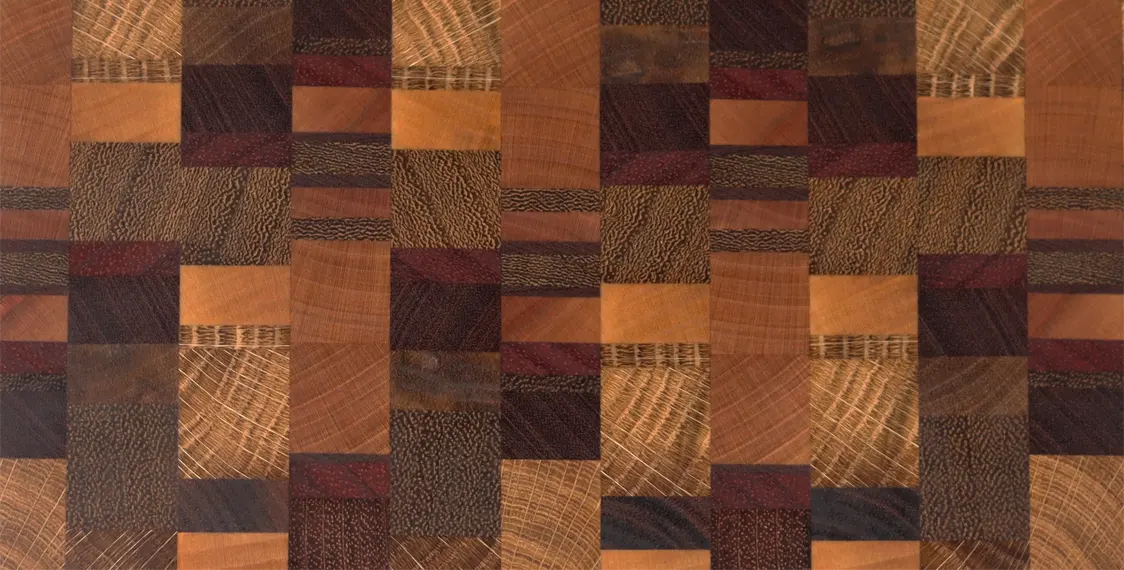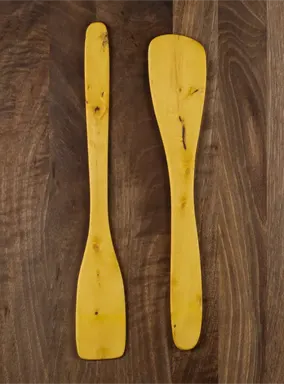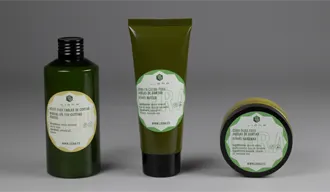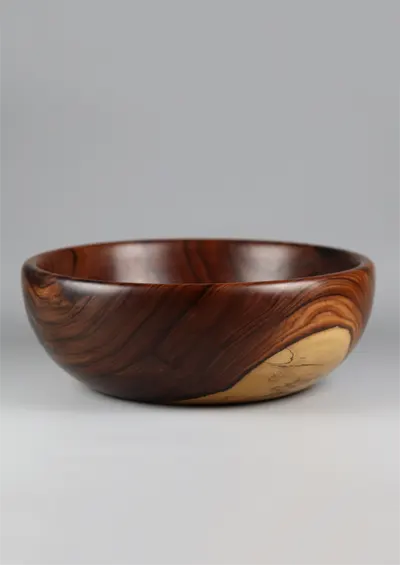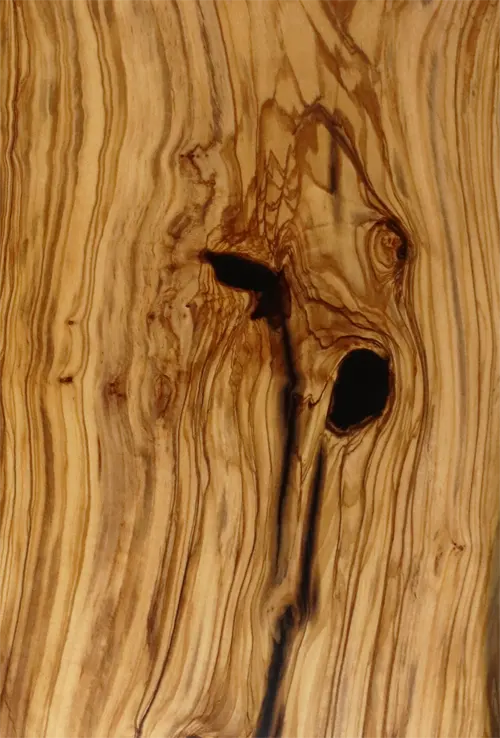Jatoba Wood: Uses and Characteristics
Jatoba wood, also known as Brazilian cherry, is known for its durability, hardness and natural strength.
Native to Central and South America, this wood is used in a variety of applications, from flooring to furniture and cutting boards, thanks to its excellent physical properties and warm aesthetic appearance.
In this article we explore in depth the most common characteristics and uses of jatoba wood.
What is Jatoba Wood?
Jatoba is a tropical wood that comes from the Hymenaea courbaril tree, which grows mainly in Brazil and other tropical regions of South America.
Jatoba wood is characterized by its coloration, which varies from a light reddish brown to a darker brown, with subtle veins that give it a rich and elegant appearance.
Its texture is smooth and uniform, and its grain is mostly straight, which facilitates its glossy finish.
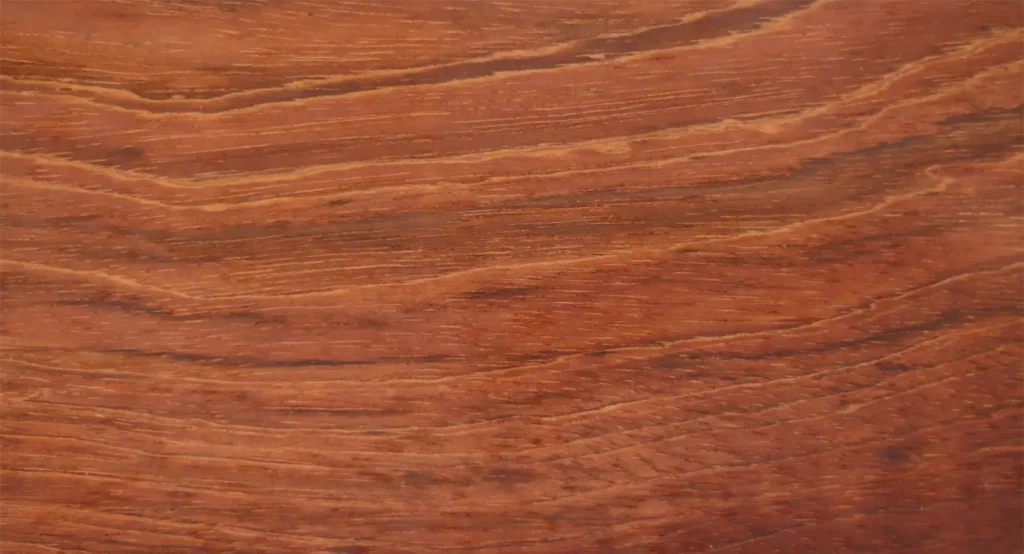
Characteristics of Jatoba Wood
Hardness and Density
Jatoba is one of the hardest and densest woods, with a density ranging from 900 to 1150 kg/m³, making it extremely resistant to wear, impact and constant traffic. This makes it an ideal choice for floors and surfaces subject to intensive use.
Durability
Jatoba wood is highly durable, being naturally resistant to rot, fungi and insect attacks. This durability makes it an excellent choice for both interior and exterior applications, although exterior maintenance is recommended.
Aesthetic Appearance
Jatoba has a warm color that darkens with time and exposure to light, creating an attractive patina. Its straight grain and uniform texture allow for high quality finishes, making it ideal for decorative and luxury projects.
Ease of Work
Despite its hardness, jatoba works relatively well. It cuts, sands and polishes with precision, and accepts a variety of finishes, including varnishes and oils, that enhance its natural tones.
Technical characteristics of jatoba wood
| Property | Approximate value |
|---|---|
| Scientific name | Hymenaea courbaril |
| Botanical family | Fabaceae |
| Colour | Orange-brown to reddish, with darker veins; darkens with age |
| Texture | Fine to medium |
| Grain | Mostly intertwined |
| Hardness (Janka) | 2,690 lbf (≈ 11.950 N) |
| Density | 900–1,100 kg/m³ (very dense wood) |
| Natural durability | Very high; excellent resistance to fungi, termites and wear |
| Dimensional stability | Buena si se seca correctamente |
| Ease of work | Medium to low; tends to wear tools and requires pre-drilling |
| Surface finish | Excellent; accepts oils, varnishes and high-gloss lacquers well |
| Common uses | Flooring, flooring, luxury furniture, stairs, cabinetmaking, cladding, tool handles |
Uses of Jatoba Wood
Cutting Boards and Kitchen Utensils made of jatoba wood
Thanks to its hardness and low porosity, jatoba is an excellent choice for the manufacture of cutting boards.
Its cut resistance makes it ideal for those who want a board that will not deteriorate over time, but will quickly dull knives.
These characteristics make it perfect for cutting boards, where knife damage is reduced, or for food presentation boards, where its beautiful grain will stand out.
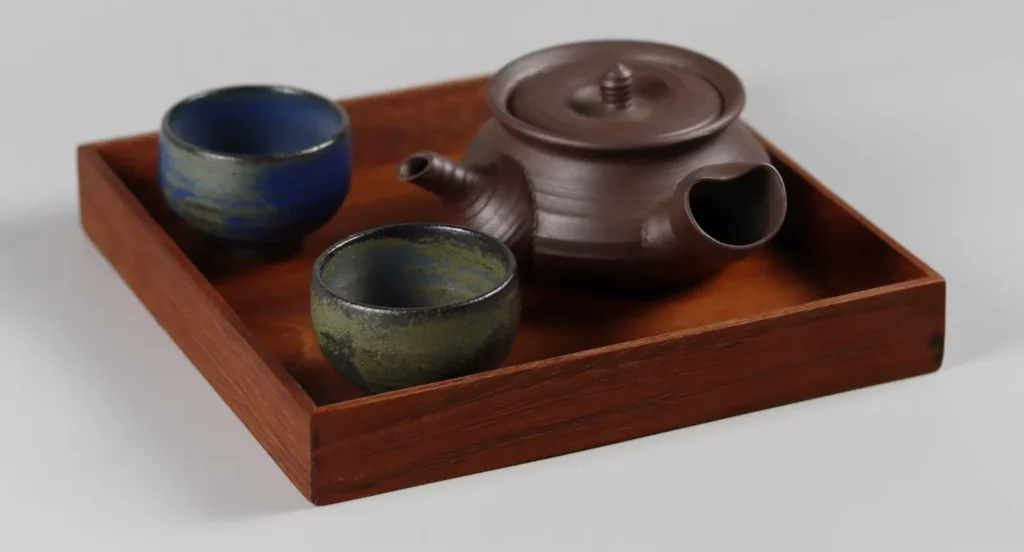
Wood Flooring
One of the most common uses of jatoba wood is in flooring. Its high density and wear resistance make it an ideal choice for floors that must withstand constant traffic, such as in high-traffic commercial or residential areas. In addition, its warm color adds a touch of elegance to any space.
High Quality Furniture
Jatoba is a popular choice in the manufacture of fine furniture. Because of its strength and attractive appearance, it is used to make tables, chairs, cabinets and other furniture requiring long-term durability and a luxurious finish.
Carpentry and Coatings
Jatoba is also used in luxury joinery for interior and exterior cladding, moldings and decorative panels. Its straight grain and ability to accept finishes make it suitable for applications where a high level of detail and finish is sought.
Jatoba Wood Advantages and Considerations
Advantages:
- Highly Resistant: The hardness and durability of jatoba make it resistant to wear, impact, insect and moisture damage, making it a reliable choice for flooring, furniture and exteriors.
- Attractive Appearance: Its warm brown color and uniform grain provide an elegant and sophisticated appearance in any application.
- Versatility: It can be used in a wide variety of applications, from flooring and furniture to kitchen utensils, due to its strength and beauty.
Considerations:
- Difficult to work with: Due to its high hardness, jatoba can be difficult to cut and work with common tools. It requires specialized tools for carpentry projects.
- Darkening over time: Jatoba tends to darken over time, which can be a disadvantage if its original color is to be maintained. However, this can be avoided with the use of protective treatments.
- Cost: It is a low cost tropical wood compared to other woods such as mahogany, walnut or wenge.
Conclusion
Jatoba wood is an excellent choice for those seeking a combination of durability, strength and aesthetics. From high-traffic flooring to luxury furniture and cutting boards, jatoba offers superior performance and natural beauty that make it stand out in any project. Although its hardness can be a challenge on the job, its strength and longevity justify the investment in high-quality applications.
Our jatoba wood products
-
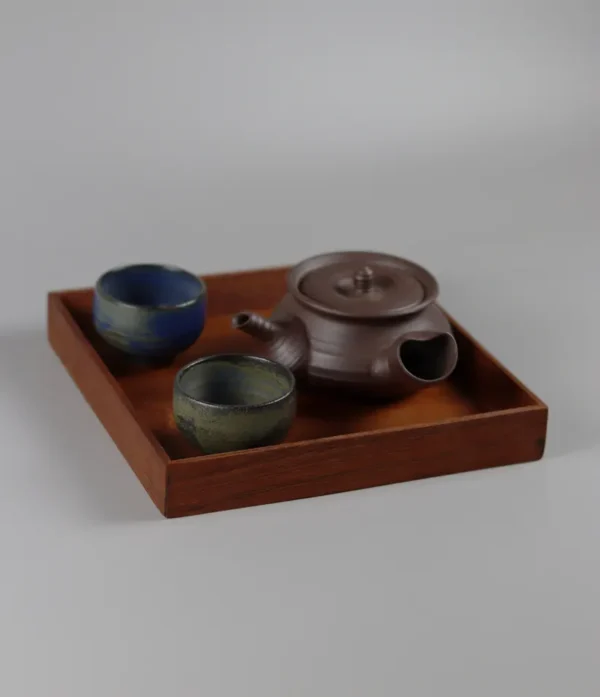 Jatoba Tray
Jatoba Trayhardwood tray
€ 121,00
Frequently asked questions about Jatoba wood
What is jatoba wood and where does it come from?
Jatoba wood comes from the Hymenaea courbaril tree, native to Central and South America, especially Brazil. It is also known as the “Brazilian cherry” due to its color and appearance, although it is not related to the true cherry.
What does jatoba wood look like?
It has an orange-brown or reddish color that darkens over time to a deep brown. Its grain can be interlocked and features attractive veins that give it a warm and luxurious appearance.
How hard and durable is jatoba wood?
It’s one of the hardest woods on the market, with a Janka hardness of 2,690 lbf. It has great resistance to wear, impact, and abrasion, making it ideal for flooring and high-traffic applications.
Can jatoba wood be used outdoors?
Yes, thanks to its high density and natural durability, it can be used outdoors if properly sealed. However, it’s more commonly seen indoors due to its elegant finish and value.
Is jatoba wood difficult to work with?
Relatively. Although it can be machined with appropriate tools, its high density and interlocking grain can wear down tools and cause chipping. Pre-drilling is recommended before nailing or screwing.
What finishes does jatoba accept?
It accepts all types of finishes very well: oils, varnishes, lacquers, and polyurethanes. With proper sanding and sealing, high-gloss finishes are achieved that enhance its natural color and grain.
What is jatoba wood used for?
It is primarily used in high-end flooring, decking, luxury furniture, staircases, structures, cabinetry, tool handles, and interior trim where aesthetics and durability are desired.
Is jatoba a stable wood or does it warp easily?
It has good dimensional stability once properly dried. However, it may show some movement if not dried in a controlled manner. It is important to purchase it already stabilized to avoid problems.
Is jatoba a sustainable wood?
It depends on its origin. There are responsible farms with FSC certification, but also markets that extract it without control. Therefore, it is essential to verify its traceability before purchasing it.
What makes it different from other tropical hardwoods?
Jatoba combines an attractive aesthetic with extreme hardness. Unlike ipe, it is visually warmer; and compared to woods like cumaru, it generally offers a smoother surface and better finish.
Otras entradas del blog
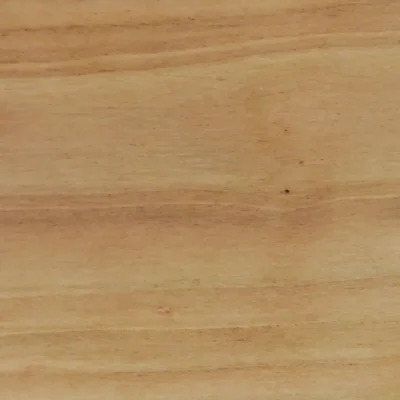
Cherry Wood: Uses and Characteristics
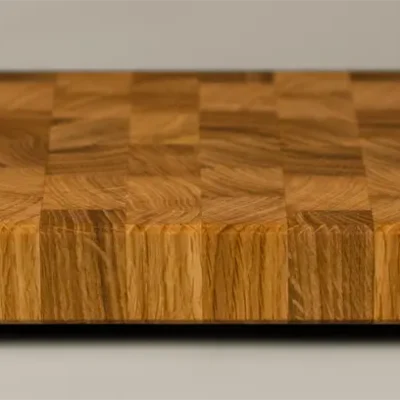
What are the best woods for cutting boards?
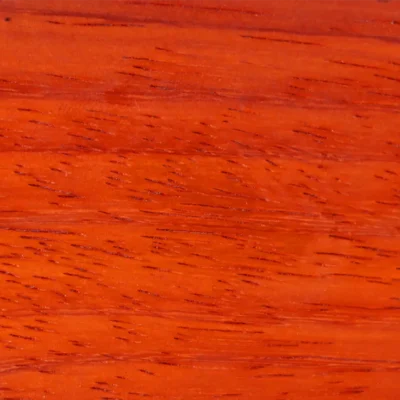
Padouk Wood: Uses and Characteristics
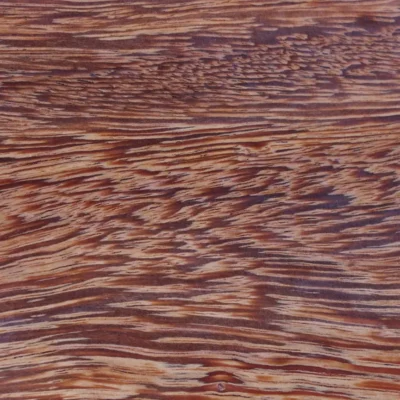
Sucupira Wood: Uses and Characteristics
Nuestras tablas de cortar:
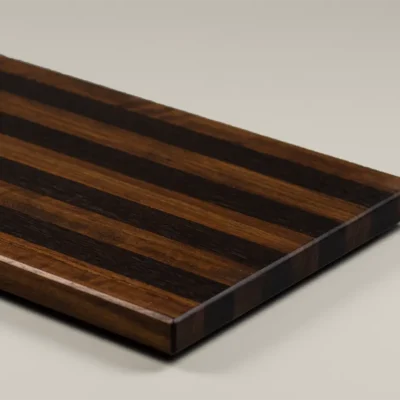
UMBRA
serving board
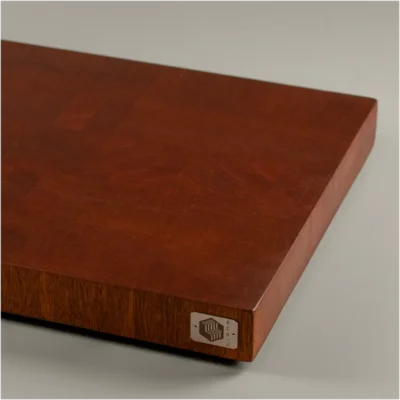
sapele end grain
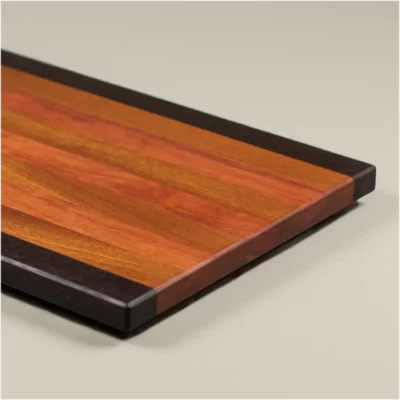
Splendida
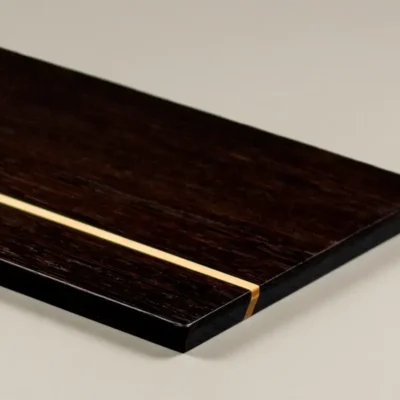
NIGRA
serving board
